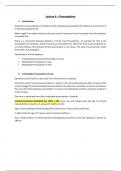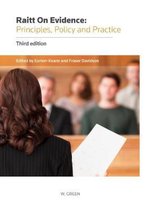Lecture 4 – Presumptions
1. Introduction:
Definition: A presumption is the ability to take something for granted and to believe it as truth until it
is otherwise displaced, OR
(More Legal) To be able to draw an inference as to the existence of one fact drawn from the existence
of another fact.
There is a connection between Burdens of Proof and Presumptions. An example for that is the
presumption of innocence, which of course we all benefit from. When the state is prosecuting us for
a criminal offence, then because of that presumption in our favour, the state, the prosecutor, bears
the burden of proving guilt.
Classifications of Presumptions:
• Irrebuttable (Conclusive) Presumptions of Law
• Rebuttable Presumptions of Law
• Rebuttable Presumptions of Fact
2. Irrebuttable Presumptions of Law:
Operate by rule of law (i.e. they arise from Common law or Statute).
Sometimes called ‘conclusive presumptions’, which is a bit of a paradox because what it means is that
once the trigger facts have brought that presumption into play, there's actually no amount of evidence
that can rebut that particular presumption. It can't be contradicted by evidence, however strong it is
to the contrary.
The court is absolutely bound by irrebuttable presumptions. Example:
Criminal Procedure (Scotland) Act 1995, s 41A (note: this will change when the age of criminal
responsibility is raised to 12, along with liability, by the:
Age of Criminal Responsibility (Scotland) Act 2019 (once in force) will provide that:
‘A child under the age of 12 years cannot commit an offence.’
Thus, children below 12 will be deemed irrebuttably/conclusively to lack the capacity to commit an
offence.
, 3. Rebuttable Presumptions of Law:
Similar to Irrebuttable Presumptions these operate by rule of law, but as the name suggests, these
Presumptions may be rebutted by evidence. A rebuttable presumption in law often exists in situations
where it's perhaps very difficult to be 100% sure about something. e.g:
a. The Presumption of Death (Scotland) Act 1977:
Labacianskas v Labacianskas 1949 SC 280 *
This was a case that predated the 1977 Act, and it involved a woman whose husband had gone off -
some 20 years before she brought the proceedings - to America. He left to start a new life for the
family and he just vanished. He never came back. 20 years later, she raised proceedings in the Scottish
court, seeking to have her marriage set aside and seeking to have an order that her husband could be
presumed to be dead. Ultimately, she was successful in that. But it was there were a lot of legal hoops
that the court had to go through.
Presumption of Death (S) Act 1977, s1(1)
'Where a person who is missing is thought to have died or has not been known to be alive for a period
of at least seven years, any person having an interest may raise an action of declarator of the death of
that person (hereafter in this Act referred to as the 'missing person') in the Court of Session or the
sheriff court …'
b. The Presumption against Donation:
The law draws a distinction between donation 'inter vivos' (amongst the living) and donation 'mortis
causa' (on death). Donatio non praesumitur – donation is not presumed. We do not assume that
people just give things away.
British Linen Company v Martin (1849) 11D 1004 (per Lord Jeffrey at 1011):
‘Donation, undoubtedly, is not to be presumed; but, on the other hand, it is not to be rejected, unless
some other tangible solution consistent with the whole facts of the case, can be suggested, and the
want of any such alternative amounts to real proof in its favour.’
c. ‘Omnia praesumuntur rite et solemniter acta esse’
‘Everything is done validly and in accordance with the necessary formalities’
Presumption carries particular weight when it is sought to disturb an earlier transaction after a long
time.
Bain (Watt) v Assets Co. 1905 7F (HL) 104
About 20 years after a bank was wound up and creditors had been paid, someone tried to argue that
it hadn't been done properly. the court was not keen to unravel that, instead choosing to rely on the
presumption that we're entitled to presume or assume even that something has been done properly
– unless, of course, clear evidence is provided at a later stage to show that is not the case.
(per Lord Chancellor at 106): ‘every intendment should be made in favour of what has been done as
being lawfully and properly done’.





